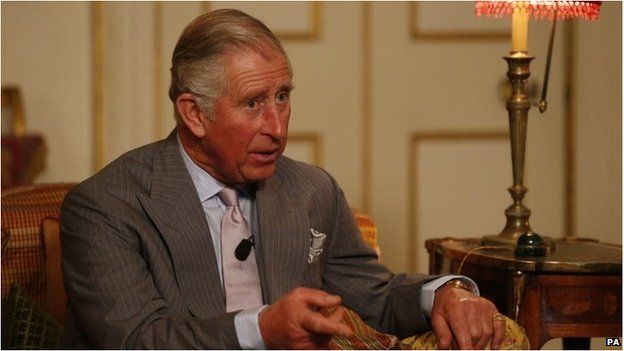Prince Charles letters row: Supreme Court to hear case
- Published

The Supreme Court is set to consider whether letters from Prince Charles to the government should be made public.
The Attorney General's Office is appealing against a Court of Appeal ruling that it unlawfully prevented letters being released.
Guardian journalist Rob Evans applied to see letters to seven government departments written in 2004 and 2005.
The attorney general has said releasing the letters would undermine the principle of the heir being neutral.
The Guardian newspaper said it had been "pressing the government" for nine years to see letters written by the Prince of Wales between September 2004 and April 2005 "to influence official policies".
Mr Evans's requests, under the Freedom of Information Act 2000 and the Environmental Information Regulations 2004, were initially denied by the information commissioner.
But several legal decisions followed:
- In September 2012 the Upper Tribunal ruled that Mr Evans and the public were entitled to see "advocacy correspondence" from the prince (27 out of the 30 letters)
- The seven government departments concerned did not appeal but Dominic Grieve, then attorney general, imposed a veto
- In March this year, three Court of Appeal judges unanimously ruled that Mr Grieve had "no good reason" for using the ministerial veto
- Seven justices at the Supreme Court in London will now hear a challenge by current Attorney General Jeremy Wright QC against the Court of Appeal ruling
Analysis
By Peter Hunt, BBC diplomatic and royal correspondent
This has been a lengthy and costly legal battle which should be nearing its end.
The focus on how Prince Charles operates has greater significance the closer he gets to the throne.
We know he'll be a different monarch to his mother, but just how different?
The Guardian newspaper and the prince's critics argue the public has a right to know what influence he exerts behind the scenes.
His supporters maintain he has a duty to contact ministers in private and his way of operating will change when he is king.
In the coming months, unless there's a referral on an issue of European law to the Court of Justice in Luxembourg, we'll have a resolution.
Either Prince Charles's confidential communications will remain just that.
Or his letters, which are often characterised by underlinings and exclamation marks, will be exposed to a wider audience than was originally intended.
The seven government departments the prince wrote to were Business, Innovation and Skills; Health; Children, Schools and Families [now the Department for Education]princ; Environment, Food and Rural Affairs; Culture, Media and Sport; the Northern Ireland Office and the Cabinet Office.
Using his veto in 2012, Mr Grieve said any perception that the prince had disagreed with the then Labour government "would be seriously damaging to his role as future monarch because if he forfeits his position of political neutrality as heir to the throne, he cannot easily recover it when he is king".
In a two-day hearing due to begin later, the Supreme Court justices will consider various issues including whether Mr Grieve's use of the veto was "lawful and/or taken on reasonable grounds".
Their ruling is expected at a later date.
- Published29 June 2014
- Published12 March 2014
- Published16 October 2012
- Published18 September 2012